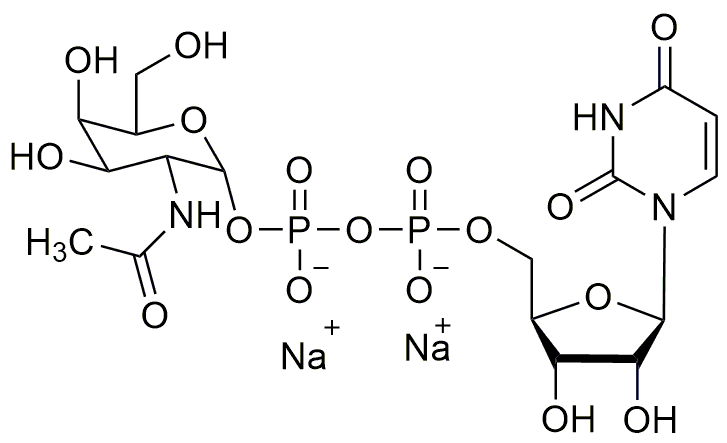Uridine 5'-diphospho-N-acetylglucosamine sodium salt is widely utilized in research focused on:
- Biotechnology: This compound plays a crucial role in glycosylation processes, which are essential for the production of glycoproteins and glycolipids in biopharmaceuticals.
- Cell Biology: It is used as a substrate in various enzymatic reactions, helping researchers study cellular signaling pathways and metabolic processes.
- Drug Development: The compound aids in the design of new drugs targeting glycosylation-related diseases, providing insights into potential therapeutic strategies.
- Food Industry: It is explored for its potential in enhancing the nutritional profile of functional foods through its role in carbohydrate metabolism.
- Regenerative Medicine: Researchers utilize it in studies related to tissue engineering and stem cell differentiation, as it influences cell growth and development.
Informations générales
Propriétés
Sécurité et réglementation
Applications
Uridine 5'-diphospho-N-acetylglucosamine sodium salt is widely utilized in research focused on:
- Biotechnology: This compound plays a crucial role in glycosylation processes, which are essential for the production of glycoproteins and glycolipids in biopharmaceuticals.
- Cell Biology: It is used as a substrate in various enzymatic reactions, helping researchers study cellular signaling pathways and metabolic processes.
- Drug Development: The compound aids in the design of new drugs targeting glycosylation-related diseases, providing insights into potential therapeutic strategies.
- Food Industry: It is explored for its potential in enhancing the nutritional profile of functional foods through its role in carbohydrate metabolism.
- Regenerative Medicine: Researchers utilize it in studies related to tissue engineering and stem cell differentiation, as it influences cell growth and development.
Documents
Fiches de données de sécurité (FDS)
La FDS fournit des informations de sécurité complètes sur la manipulation, le stockage et l’élimination du produit.
Spécifications du produit (PS)
Le PS fournit une description complète des propriétés du produit, notamment sa composition chimique, son état physique, sa pureté et les exigences de stockage. Il détaille également les plages de qualité acceptables et les applications prévues du produit.
Certificats d'analyse (COA)
Recherchez des certificats d'analyse (COA) en saisissant le numéro de lot du produit. Les numéros de lot et de lot se trouvent sur l'étiquette d'un produit, après les mots « Lot » ou « Lot de fabrication ».
Numéro de catalogue
Numéro de lot/série
Certificats d'origine (COO)
Ce certificat d'exploitation confirme le pays dans lequel le produit a été fabriqué, et détaille également les matériaux et composants utilisés et s'il est issu de sources naturelles, synthétiques ou autres sources spécifiques. Ce certificat peut être requis pour les douanes, le commerce et la conformité réglementaire.
Numéro de catalogue
Numéro de lot/série
Fiches de données de sécurité (FDS)
La FDS fournit des informations de sécurité complètes sur la manipulation, le stockage et l’élimination du produit.
DownloadSpécifications du produit (PS)
Le PS fournit une description complète des propriétés du produit, notamment sa composition chimique, son état physique, sa pureté et les exigences de stockage. Il détaille également les plages de qualité acceptables et les applications prévues du produit.
DownloadCertificats d'analyse (COA)
Recherchez des certificats d'analyse (COA) en saisissant le numéro de lot du produit. Les numéros de lot et de lot se trouvent sur l'étiquette d'un produit, après les mots « Lot » ou « Lot de fabrication ».
Numéro de catalogue
Numéro de lot/série
Certificats d'origine (COO)
Ce certificat d'exploitation confirme le pays dans lequel le produit a été fabriqué, et détaille également les matériaux et composants utilisés et s'il est issu de sources naturelles, synthétiques ou autres sources spécifiques. Ce certificat peut être requis pour les douanes, le commerce et la conformité réglementaire.


